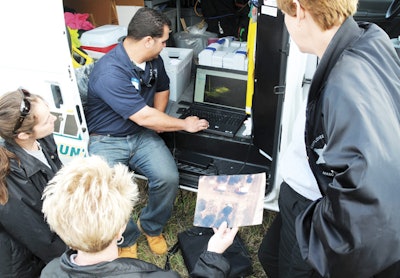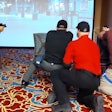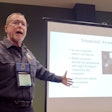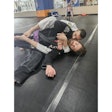 Remember to make use of all resources available to you for an investigation, whatever the type of case. Photo: Osceola County (Fla.) Sheriff's Office Forensics
Remember to make use of all resources available to you for an investigation, whatever the type of case. Photo: Osceola County (Fla.) Sheriff's Office Forensics
I have been fortunate enough to work with some highly recognized homicide detectives throughout my career. They are well known for their expertise in and around our judicial circuit. I asked some of them to mine their experiences for a series of crossover tips that could help detectives and patrol officers alike. The following bits of wisdom apply to all investigations, regardless of the nature of the crime or who is investigating.
Remember the Victim
Dep. Steve Moser is a former homicide detective who now works in the Training Unit of the Osceola County (Fla.) Sheriff's Office. He still assists in complex investigations for our office or changes roles when he is called back into court. Moser probably had the most impact during my research for this article because what he shared struck a chord with me. He said, "The first two tips I'm going to give you are the most important because they set the tone for the rest. If you don't get these two, you're going to struggle."
What came next might surprise you, because it did me. I was expecting a reference to recent case law or a specific type of interviewing technique. Instead what I learned was that in order to conduct a successful investigation, one of the key elements is to keep sight of my own humanity.
The first thing Moser mentioned was, "Never forget what it feels like to be a victim." In order to stay grounded, you need to keep the victim's point of view as part of your perspective. You have to ask yourself if you are demonstrating empathy or you are just going through the motions.
People know when you're not being sincere. The senior investigators I spoke with all agreed that a lack of empathy will cause you to lose critical information. If you don't care, then why should anyone want to talk? From a victim's standpoint, if it's only about filling out forms, they could just as easily do that without you.
The second thing Moser stressed was making sure you work every case like the victim is the most important person in your life. He then asked me two questions that you should ask yourself: "Would you respond differently if your loved one was the victim?" and "Wouldn't you make sure everything was done right if the victim was close to you?" Moser summed it up quite nicely by making it clear that you should never make someone feel victimized twice by your demeanor or lack of attention. They are already hurting and looking for answers or closure. We shouldn't be making it worse for them, and we need to keep that in mind.
The Devil's in the Details
Take your time processing the information and the scene. In order for information to be considered intelligence, it must be processed. It must be confirmed for veracity and if possible corroborated by other sources. The smallest and most insignificant piece of information could be the one that leads you to your strongest results. Collecting evidence follows the same path. Go over the crime scene methodically and document everything. You only have one chance to get it right because once it's gone, it's gone forever. All one has to do is refer back to the O.J. Simpson murder trial where the evidence was called into question because of poor handling and documentation.
Don't rush the investigation. Both the public and politicos within your agency will want quick results; don't give in to the pressure. The better tactic is to have a steady methodical pace. Rushing causes mistakes. You don't want any issues to arise with processing the scene, problems with obtaining search warrants, or when interviewing persons of interest. The decisions you make in the beginning are far more important than ones you make later because they have a direct relation to cause and effect. Take a shortcut now and it may cost you the case later.
Learn from every investigation. Make a decision to do better the next time. Don't make the same mistakes twice. As internationally recognized leadership expert John Maxwell says, "Sometimes you win and sometimes you learn." Learn from your mistakes. Seek out guidance and constructive criticism. You can always add job shadowing, reading articles, attending seminars, and keeping abreast of how others are solving their cases. If you want to get better at anything, you need to watch the masters and learn from them.
Stay focused. It's so easy to lose focus when you are being pulled in every direction. In order to be focused, you have to be task and goal oriented. You need to be very organized so that things don't fall through the cracks. You might be surprised that by adding a little structure (like creating a checklist) your investigation will go more smoothly.
Keep your predispositions in check. Sometimes we have pre-determined ideas about the people we deal with that may influence our ability to perform well. The old saying "You can't judge a book by its cover" rings true. Everyone deserves the same level of service and respect going in. They will only get that if you stay neutral and objective. When you arrive on scene, your attitude should never be, "Here we go again."
Take time to step away and regroup. Sometimes you have to step back and either do something else or just take a break. Many ah-ha moments occur this way. Though not very scientific, many investigators will tell you they get gut feelings and act on them. I know of several instances where a detective got an idea while doing something else, acted on it, and later broke a case wide open.
Utilize all of your resources. We sometimes overlook resources that are available to us. For example, say you need to search a wide area for a piece of missing evidence but lack the numbers to do it. In the past, we have asked our local police academy if we could use their students to help canvass the area. Don't forget to look for expertise within your own agency either. You will typically find experienced coworkers in all types of fields that may help you. Find your own expert and see if proper protocols were followed. Variances in rules, regulations, or standing operating procedures are often indicators that something was up.
Communication is a key to success. We must communicate with each other as the case evolves. I have known agencies to protect information as if it were a matter of national security. Obviously information has to be compartmentalized, but there must be cooperation in and out of the agency for an investigation to come together. Another unit may already have an answer but doesn't know the question.
Find the right person for the job. Do you have the right personnel assigned to the right task? As a manager I've learned that we have to deal with officers of various skill levels and mindsets. I have also learned that sometimes it's our fault an officer fails because we don't match up the right skill sets to the task we want accomplished. I have seen many officers shine when matched with the right opportunity.
Build your foundation. We are part of a "we want it now" culture. Yesterday is not soon enough as we rush to learn our craft. In a race to the finish line, people forget that it takes time, patience, and dedication over an extended period of time to make it happen. There are no shortcuts to greatness; just a lot of hard work.
It's Personal
Homicide detectives know their investigations are personal and they keep it that way. They give each case the attention it deserves. The lesson I take away from that is if your investigation doesn't have any meaning for you, your own human nature will kick in and cause you to miss something. If you want real results, it starts with you first.
Amaury Murgado is a special operations lieutenant with the Osceola County (Fla.) Sheriff's Office. He is a retired master sergeant from the Army Reserve, has more than 25 years of law enforcement experience, and has been a lifelong student of martial arts.
















